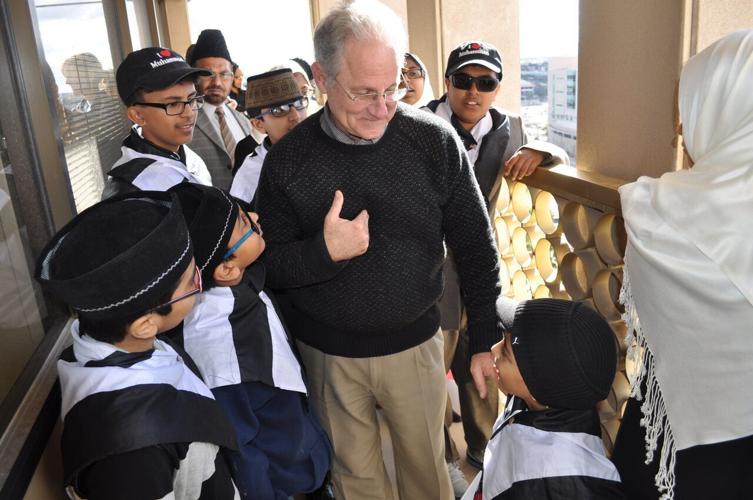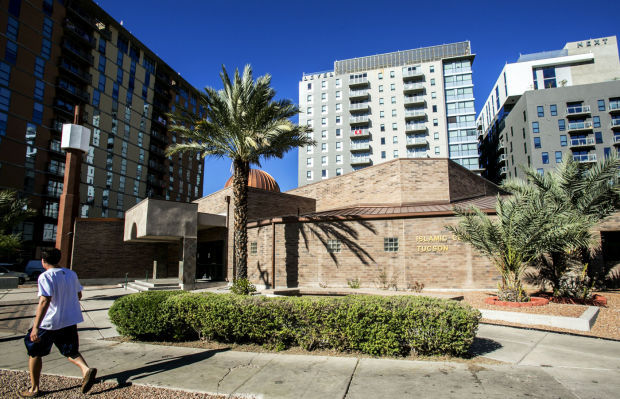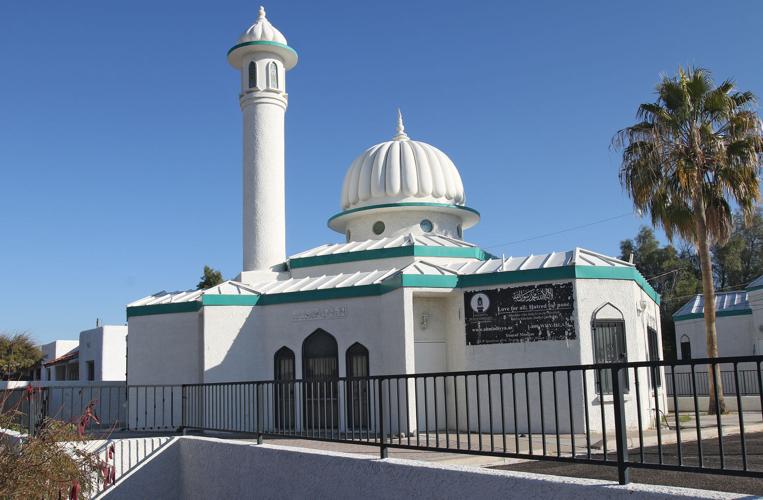About a dozen children from the Ahmadiyya Muslim Community jostled Mayor Jonathan Rothschild as he led them on a tour of the balcony wrapping around City Hall.
From the 10th floor, they craned their necks and stood on tippy-toes to see “A” Mountain here, the old Pima County Courthouse there, and way in the distance on Speedway, their mosque.
After the tour, the kids settled in a conference room to pepper Rothschild with questions: Do you like being mayor? Did you always want to be mayor? What do you do each day?
The trip to City Hall, while fun for the kids, is part of an effort by the community, a movement within Islam, to increase its involvement in Tucson. Following attacks by Islamic extremists in Paris and San Bernardino, California, last year, many Muslim communities have decided they can no longer afford to keep to themselves.
“They’re realizing it’s more important to be visible in the community than to keep a lower profile and hope nobody notices,” said state Sen. Steve Farley, who recently attended a prayer vigil at the Ahmadiyya mosque, 250 W. Speedway.
Collective support, individual discrimination
Rula Khalidi calls Tucson a “little oasis.”
“If we have seen anything consistently and overwhelmingly, it’s support and kindness from other communities,” said Khalidi, a volunteer for an interfaith committee at the Muslim Community Center of Tucson, 5100 N. Kevy Place.
When she shares this with people outside of Tucson, they don’t believe her.
Yet in the wake of calls by Republican presidential candidate Donald Trump to block Muslims from entering the country, local mosques received flowers and encouraging phone and Facebook messages.
But that’s not to say concerns have not emerged. Over the summer, protesters planned to gather outside of the Islamic Center of Tucson, 901 E. First St. Despite enthusiasm on social media, the rally was canceled.
“Remember that a lot of discrimination happens at an individual level, not at the community level,” said Ahmed Meiloud, the president of the center.
Within communities, anecdotal stories swirl — an employee terminated, a customer refused service, high school students heckled.
Umer Shahid, secretary of public affairs for the Ahmadiyya Muslim Community’s Tucson chapter, recounted the worst story he has heard so far.
“Recently, one of our community members was parked in a parking lot and a guy on a motor bike pulled over and busted her back window,” presumably because she was wearing a hijab, Shahid said.
The family declined to speak with the Star for fear of further scaring their young children, he said.
The Ahmadiyya Muslim Community, unlike other Muslims, believes Mirza Ghulam Ahmad, the 1889 founder of the movement, is the Messiah.
But like other Muslims, a woman’s choice to wear a hijab makes her faith instantly public.
“Women come to the very front lines of this because they can be easily spotted in public,” Shahid said, noting that in Tucson, Muslim men are sometimes mistaken as having Hispanic backgrounds.
Ulliya Qureshi, Shahid’s wife, was born and raised in Tucson and said learning how to handle verbal barbs takes time.
“Some people have told me, ‘Go back to your country,’” she said. “Some people have told me, ‘Take that hat off your head.’”
To those remarks, she says nothing.
Finding a voice
Unlike some local religious groups, many of Tucson’s Muslim communities have an active social-media presence.
“Social media is a mixed blessing,” said Ward 6 city Councilman Steve Kozachik. “It allows people to be vile and not held accountable, and on the other hand, there is an educational piece.”
Kozachik began working with the Islamic Center of Tucson in the fall of 2014, when University of Arizona students dropped liquor bottles onto the center from nearby high-rise apartments.
Across the nation, Rabiah Ahmed, the media and communications director for the Muslim Public Affairs Council, has seen a change in how American Muslims interact with their local communities. The organization, with offices in Washington, D.C., and Los Angeles, encourages Muslims to get involved locally and nationally.
“There’s a real understanding that if we don’t speak for ourselves, others will, and we can’t afford that,” Ahmed said. “We get that from politicians here and ISIS there.”
Tucson’s Ahmadiyya Muslim Community, like many others, sends out a condemning press release following attacks claimed by Islamic extremists.
Having conversations with neighbors about current events and fears is a responsibility of local mosques, many say.
Condemning terrorism is Muslims’ “collective responsibility,” said Khalidi.
Even that is a change, Ahmed said.
“A few years ago, there was some resistance within American Muslim communities to even acknowledge that extremism was an issue they needed to address,” she said.
Helping others
Two days after Christmas, a group from the Muslim Community Center worked with four of Southern Arizona’s United Methodist churches to pack 130,000 meals for local distribution.
That, coupled with an ongoing collection for the Community Food Bank of Southern Arizona, is part of a growing effort to help others outside of the Muslim community.
“To give and be present and help people less fortunate makes us realize we are not victims ...” Khalidi said.
“It stops the victim mentality that many get, and sometimes justifiably, but at the same time, we need to move on.”
Being able to work with organizations like the food bank is a transition out of “survival mode,” Khalidi said. Because so many Tucson Muslims come as immigrants, the first years are spent “just trying to get on your feet” — especially if young children are involved, she added.
“They are inviting interfaith conversations very openly, right in the mosque, saying, ‘Let’s not wait for tragedy to happen in order to do this again,’” Kozachik said. “They’re talking about touching the lives of the needy in the community, irrespective of faith, and that’s a change. Much of the outreach they did before was in the Muslim community.”
For the Ahmadiyya Muslim Community, that has meant holding blood drives and an Independence Day barbecue and making connections with the Pima County Interfaith Council.
At the Islamic Center, about 300 people attended an interfaith presentation in December titled, “One America for All People.”
Across Tucson last year, rabbis, priests and Muslim leaders sat down to talk publicly about their beliefs.
Actually, this isn’t new — at least not historically, said Leila Hudson, an associate professor at the UA’s School of Middle Eastern and North African Studies.
“There is a long, historical tradition and experience of living together and really having allies in the community, and having good relations with the other communities in the city or region where you live,” Hudson said.
That means being open to conversations about the concerns many Americans have about Shariah law or Quranic verses used by extremists in a context that justifies terrorism.
Tucson is not untouched by extremism. In the years following 9/11, the Star reported on connections between al-Qaida and individuals who attended the Islamic Center of Tucson — mostly in the 1980s.
While Meiloud said the center cannot control the actions of an individual, he pointed to local involvement in particular as a way to steer today’s young Muslims away from extremist ideologies and build stronger relationships with the community.
“I’m a very strong believer that if people are involved in the process, they are less likely to be pushed to the fringe because they have a social connection,” Meiloud said.
“They have a purpose. They have people around them.”









